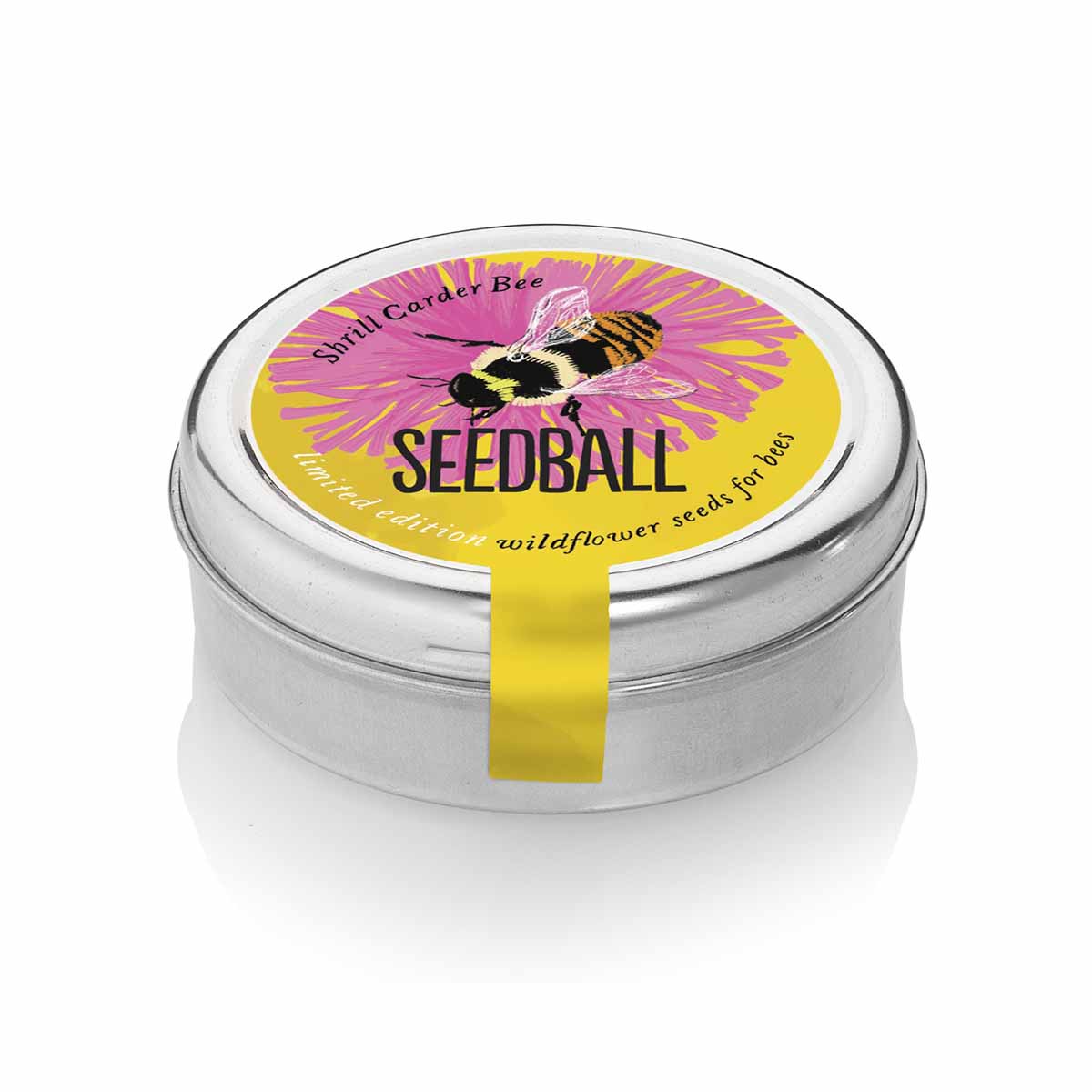Shrill Carder Bumblebee Mix Seedball Tin
Shrill Carder Bumblebee Mix Seedball Tin
SeedballOne of three new tins launched to celebrate the anniversary of the first Seedball tin in 2013. As Seedball’s mission is to help and inspire more people to grow wildflowers in their gardens for pollinators, we wanted to use our anniversary tins to help to raise awareness about three declining British bee species, and the need to keep scattering seed balls!
Each tin contains 20 seed balls, each with approximately 30 bumblebee-friendly wildflower seeds (see below for plant details). These make for lovely gardening gifts, bee gifts, eco friendly gifts or mother’s day gifts. They will work well in window boxes, balcony pots, garden beds and wildlife gardens.
- 20 Seed balls in each tin
- Limited edition
- 100% Peat-free
- Plastic free
In stock
Description
Shrill Carder Bumblebee Mix - Contains 20 Seedballs
The Shrill Carder Bee is one of the UK’s rarest bumblebees, and can only be spotted in a handful of locations in Southern Wales and Southern England. The mix includes 7 super bee friendly flowers: Common Knapweed, Great Burnet, Cowslip, Self Heal, Meadowsweet, Birdsfoot Trefoil and Buttercup.
One tin of seed bombs will cover 1 square metre in a garden bed or 3-5 medium sized pots (leave at least 10cm between each ball). Best scattered in Spring or Autumn.
Shrill Carder Bee Mix Contains:
Common Knapweed : The tightly packed, thistle-like purple flower heads of common knapweed bloom on all kinds of grasslands. Also regularly called 'black knapweed, this plant attracts clouds of butterflies.
Great Burnet : A tall plant, Great burnet has oval, crimson flower heads that appear on long, green stalks, giving them the look of lollipops.
Cowslip : The origin of the name cowslip is unclear, but it may derive from the fact that it grows in meadows well manured by cow dung or cow slips.
Self Heal : The common name Selfheal, sometimes written as Self-heal, refers to the plant having been used as a treatment for wounds and bruises until recent times.
Meadowsweet : A tall grassland perennial with clusters of creamy white flowers.
Birdsfoot Trefoil : A perennial with clusters of yellow/orange pea like leaves.
Meadow Buttercup : The tallest and most elegant of our native buttercups, this plant sometimes reaches a height of 90cm. This native winter-green perennial is found on most grazed or cut grasslands throughout Britain, but has a preference for moist soils.
Packaging -
Plastic free steel tin.
How To Use
Seed balls don’t need planting or complex propagation – just scatter them where you want them to grow (preferably on top of soil or compost), and let nature take over! It really is that simple! Seed balls will also grow equally well in pots or other planters.
How do I use Seedballs?
Throw onto soil or compost in a garden bed or planter in Spring or Autumn, leaving at least 10cm between each ball.
Your seedball has everything it needs to grow and, once the ball becomes moist and the temperature is right, your seeds will germinate.
What area will my Seedballs cover?
We would usually advise 20 seed balls per square metre, or 3-5 seed balls for a 35cm container.
Materials
Steel Tin
Each tin contains 20 balls and around 30 wildflower seeds per ball.
Each seed ball is made from seeds, clay, peat-free compost and chili powder.
Delivery Options
Royal Mail 48 Hour Tracked Delivery – £4.25 – Tracked 2-3 day service.
Royal Mail 24 Hour Tracked Delivery – £4.90 – Tracked 1-2 day service.




